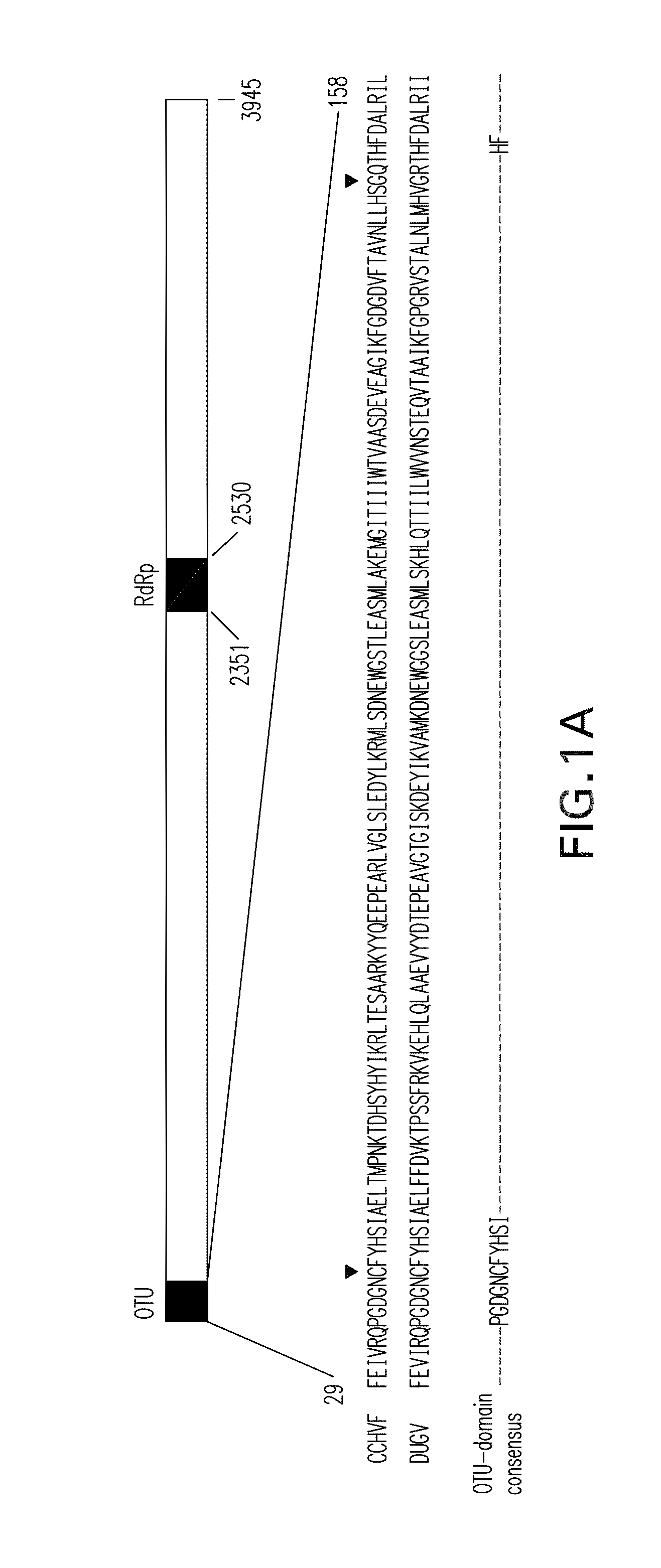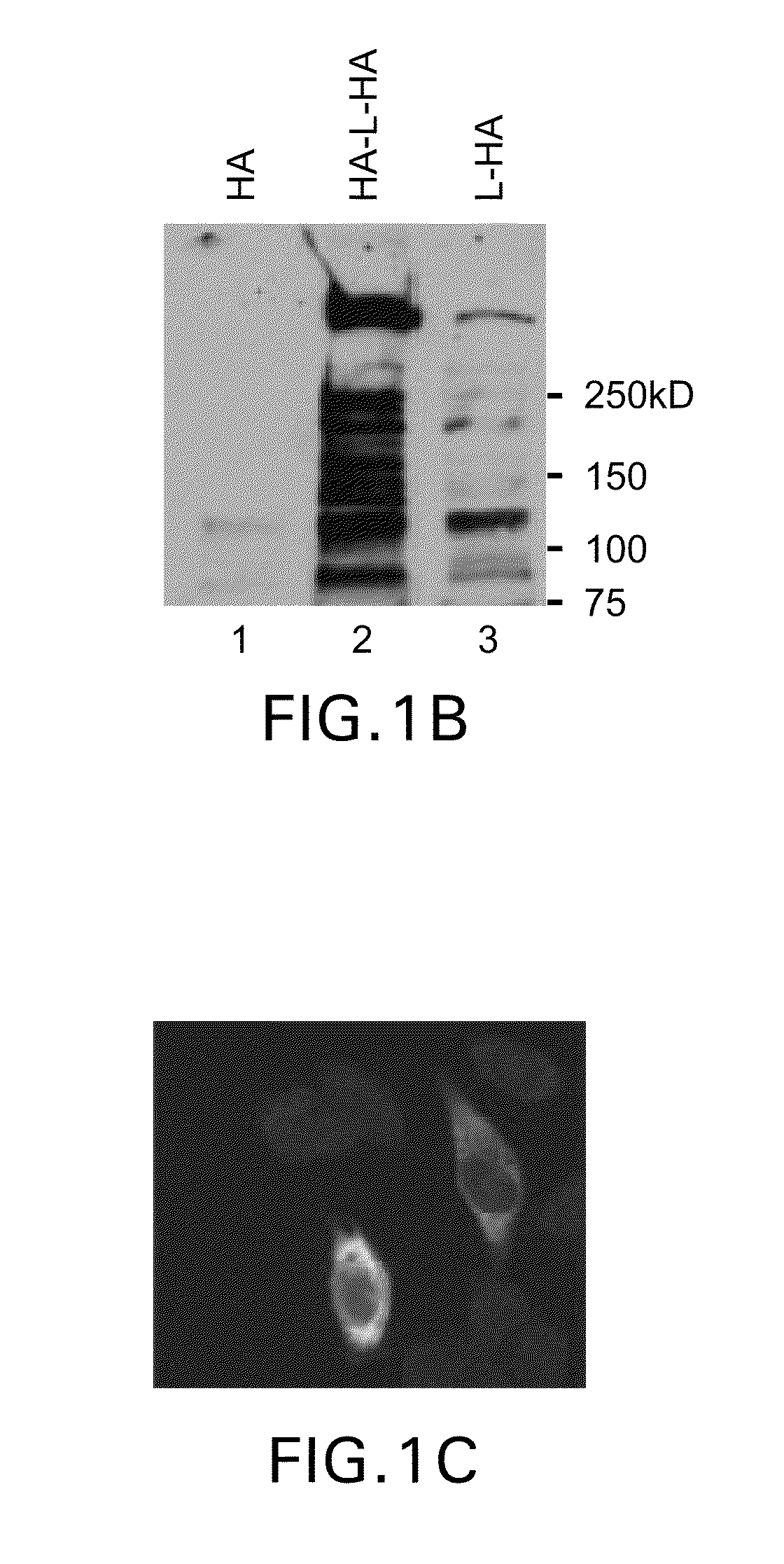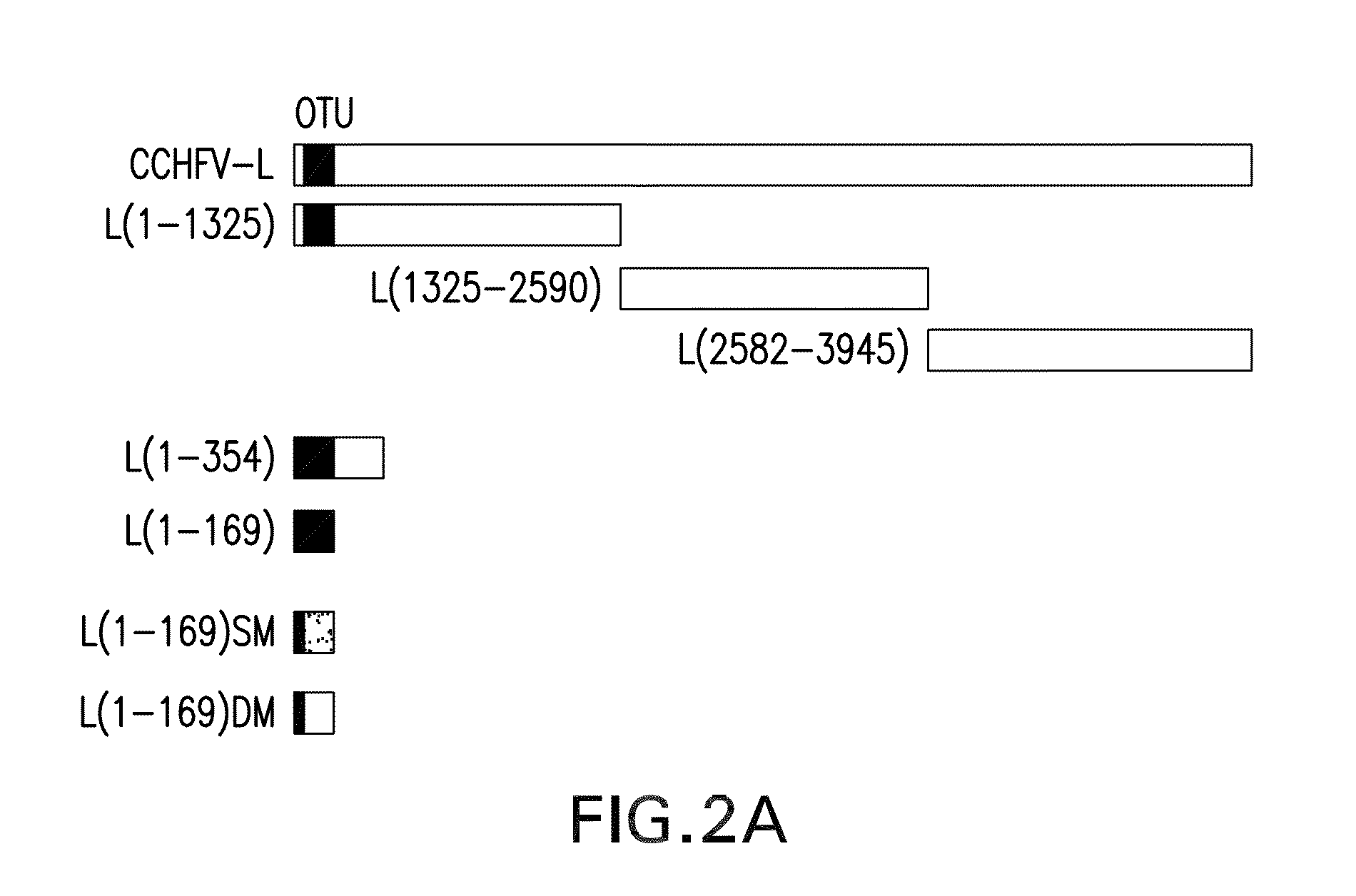METHODS OF PREVENTING AND TREATING VIRAL INFECTIONS BY INHIBITING THE DelSGYLATION ACTIVITY OF OTU DOMAIN-CONTAINING VIRAL PROTEINS
a technology of viral proteins and delsgylation activity, which is applied in the direction of antibody medical ingredients, peptide sources, instruments, etc., can solve the problems of reducing the ability of the virus to antagonize the cellular interferon response, reducing the ability of the virus to replicate and/or to counteract one or more antiviral host responses, etc., to reduce or eliminate the ability of the viral otu domain-containing protein, reduce or eliminate the ability of the viral
- Summary
- Abstract
- Description
- Claims
- Application Information
AI Technical Summary
Benefits of technology
Problems solved by technology
Method used
Image
Examples
example 1
6. EXAMPLE 1
Novel DeISGylation Activity of the CCHFV L Protein and Other Viral Proteins
[0514]This example demonstrates the deconjugating activity of viral OTU domain-containing proteins towards both ISG15 and ubiquitin (Ub) conjugates. This example also demonstrates the requirement for a cysteine at position 40 for the ISG15 and ubiquitin deconjugating activity of CCHFV L.
[0515]6.1 Materials and Methods
[0516]6.1.1 Cell Culture, Virus and Antibodies
[0517]The cells used in this study (293T, HeLa, BHK-21 and UBP43− / − MEF) were maintained in DMEM culture medium (Gibco, San Diego, Calif., USA) supplemented with 10% fetal calf serum (Hyclone, South Logan, Utah, USA), 100 U / ml of penicillin G sodium and 100 μg / ml of streptomycin sulfate (Gibco). Cells were maintained in a humidified 5% CO2 atmosphere at 37° C.
[0518]CCHFV prototype strain IbAr10200, first isolated in 1976 from Hyalomma excavatum ticks from Nigeria, was grown in SW 13 cells and viral RNA was isolated from cells supernatants ...
example 2
7. EXAMPLE 2
Novel DeISGylation Activity of the CCHFV L Protein and Other Viral Proteases as Compared to Cellular OTU Domain-Containing Proteins and Role in Immune Evasion
[0584]This example demonstrates that the OTU domain-containing proteases from nairoviruses and arteriviruses, two unrelated groups of RNA viruses, hydrolyze Ub and ISG15 from cellular target proteins. These viral OTU domains, in contrast to known mammalian OTU proteases, display a broad deconjugating activity towards ubiquitinated and ISGylated products and consequently inhibit innate immunity pathways that are dependent on Ub and ISG15. The viral OTU domain-containing proteases inhibit TNFα and NF-κB dependent signaling.
[0585]7.1 Materials and Methods
[0586]7.1.1 Expression Plasmids.
[0587]Plasmids pCAGGS.-6HismISG15, pCAGGS-hUBE1L-HA, pFLAGCMV2-UbcM8 and pcDNA3.1-UbcM8 were provided by Dong-Er Zhang (Scripps Research Institute, La Jolla, Calif., USA) (Giannakopoulos et al., 2005). Herc5 was provided by Motoaki Ohtsu...
example 3
8. EXAMPLE 3
Deubiquitinating and DeISGylating Activity of CCHFV-L OTU
[0651]This example demonstrates that the deubiquitinating and deISGylating activity of viral OTU domain-containing proteins may be assessed in assays amenable to high throughput.
[0652]Ubiquitin or ISG15 is fused in its carboxy-terminus to the fluorogenic substrate 7-amido-4-methylcoumarin (AMC) (Dang et al., 1998; Stein et al., 1995). These substrates are highly sensitive and allow for monitoring continuous enzymatic activity. Alternatively, ubiquitin or ISG15 fused to 7-amino-4-trifluoromethylcoumarin (AFC) can be used as substrate. This latter fluorophore has a larger Stokes radius than AMC which is useful to reduce compound interference in high-throughput assays.
[0653]The AMC- or AFC-based enzymatic assays allow the substrate specificity of the viral OTU domain-containing proteins to be tested. Such assays may include inhibitors, such as Ub / ISG15-aldehyde or Ub / ISG15-vinyl sulfone. Quantifying the rate of releas...
PUM
| Property | Measurement | Unit |
|---|---|---|
| immunogenic composition | aaaaa | aaaaa |
Abstract
Description
Claims
Application Information
 Login to View More
Login to View More - R&D
- Intellectual Property
- Life Sciences
- Materials
- Tech Scout
- Unparalleled Data Quality
- Higher Quality Content
- 60% Fewer Hallucinations
Browse by: Latest US Patents, China's latest patents, Technical Efficacy Thesaurus, Application Domain, Technology Topic, Popular Technical Reports.
© 2025 PatSnap. All rights reserved.Legal|Privacy policy|Modern Slavery Act Transparency Statement|Sitemap|About US| Contact US: help@patsnap.com



